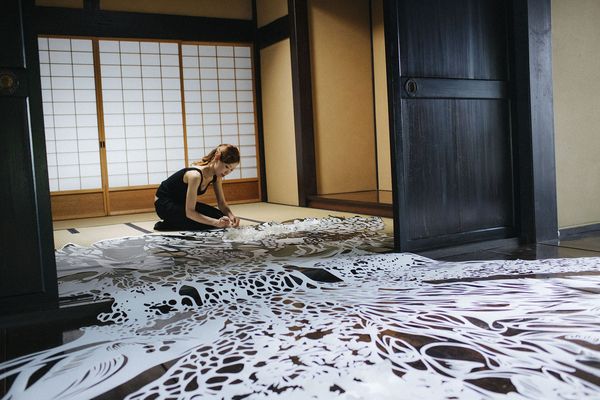 |
| Nahoko Kojima in Clay Jeter's Takumi: A 60,000 Hour Story On The Survival Of Human Craft, produced by Rupert Maconick: "Let's do an interesting film about the future." |
Rupert Maconick, Founder of Saville Productions, has worked with an impressive list of filmmakers, including Wim Wenders, Spike Lee, Morgan Neville, Fernando Meirelles, Barry Levinson, Stephen Daldry, Martin Campbell, Paul Haggis, Gavin O’Connor, James McTeigue, producing Michael Apted's Bending The Light, Werner Herzog's From One Second To The Next and Lo And Behold: Reveries Of The Connected World.
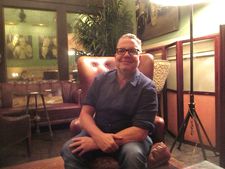 |
| Rupert Maconick on Werner Herzog: "We're doing a lot of stuff with him around social good." Photo: Anne-Katrin Titze |
Takumi: A 60,000 Hour Story On The Survival Of Human Craft, directed by Clay Jeter and written by Dave Bedwood, highlights artisans Shigeo Kiuchi, Hisato Nakahigashi, Nahoko Kojima and Lexus Takumi Katsuaki Suganuma and features interviews with Nora Atkinson, Curator of Craft at the Smithsonian American Art Museum in Washington, D.C., Digital Factory of Formlabs Director Jon Bruner, and Rise Of The Robots: Technology And The Threat Of A Jobless Future author Martin Ford.
At the Soho Grand Hotel Club Room, following the world première of Takumi: A 60,000 Hour Story On The Survival Of Human Craft (58 minutes version) last Sunday at DOC NYC, producer Rupert Maconick joined me for a conversation on the Lexus sponsored documentary that is narrated by Neil Macgregor, the former director of the National Gallery and British Museum and future director of the Humbolt Forum in Berlin.
Anne-Katrin Titze: You said you gave a talk in Stuttgart last week? Anything to do with cars?
Rupert Maconick: The Product Placement - I can't remember what they're called, some association they asked me to come, so I did and I did a talk on the future of advertising.
AKT: The future of advertising! Is Takumi the future of advertising?
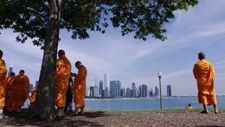 |
| Werner Herzog's Lo And Behold: Reveries Of The Connected World, produced by Rupert Maconick |
RM: The future of advertising is entertainment. Because no one wants to watch anyone's boring ad anymore. And everything's disrupted, so the Takumi film, for example, was Lexus being fairly forward thinking. Let's do an interesting film about the future.
AKT: And the past?
RM: Yeah. And the value of craftsmanship and how that's not necessarily going to go away and the two could marry and so on. And at the same time just the actual notion of how one does marketing got totally disrupted because nobody wants to watch anything that's related to a brand. But all marketing people are being taught that the brand has to be the hero.
It's an interesting time right now because everyone has to unlearn what they'd been taught. And they actually have to create entertainment. So I think the people who are making the best promotional films at the moment, which are basically ads, are Hollywood. Think about it - G.I. Joe, the movie, Lego, the movie - those are there to sell toys.
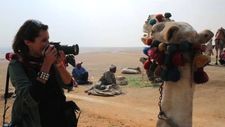 |
| Michael Apted's Bending The Light, produced by Rupert Maconick |
AKT: You have worked with a lot of interesting directors. Two of them being at DOC NYC with you here right now.
RM: Which ones?
AKT: Morgan Neville (Won't You Be My Neighbor?) and Wim Wenders (Pope Francis: A Man of His Word).
RM: Right, absolutely.
AKT: You didn't catch up with them here or run into each other by chance?
RM: No, I didn't. There's a whole range of different directors. We've been doing a lot of stuff with Werner Herzog. We're doing a lot of stuff with him around social good. So we might be doing a documentary on global plastics.
AKT: With Werner Herzog?
RM: With Werner, yeah.
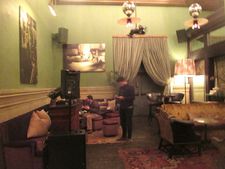 |
| Soho Grand Hotel Club Room in New York Photo: Anne-Katrin Titze |
AKT: In Takumi, you start with images of cars and then the film goes into three different stories of craftsmanship and then, as I said to your colleague [Dave Bedwood] who wrote the script, it returns to the "car whisperer." The structure does not have the product front and centre, you talk about other things as well.
RM: That's the whole point. Advertising needs to become entertainment and on some level we're trying to make this more entertaining and actually talk about bigger issues. And put the story of the brand within that without it feeling that it's about that.
AKT: It still comes as somewhat of a surprise because it doesn't match the previous three stories where we find out, for example, about the oldest carpentry company in the world. You advertise that as well in a way. It's lovely to see that such a building firm, working entirely without nails, building temples, still exists.
RM: You're going to find unusual things. No one really knew, at least in the West, nobody knows the story about the oldest carpentry company [Kong? Gumi in Osaka] in the world. So we were always looking for unusual stories.
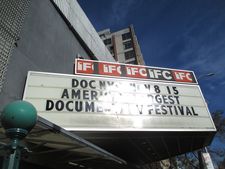 |
| IFC Center marquee - DOC NYC Photo: Anne-Katrin Titze |
And the notion what a Takumi was, was something that was new to us. 10,000 hours we got from somewhere else and the Japanese think it's actually 60,000 hours. And it's an ongoing process, you don't just stop at 60,000 hours, you keep learning. That is the true definition of an artisan craftsman, I think.
AKT: The question is, will there still be room in the future for that kind of craftsmanship?
RM: We just had the screening here and a lot of people liked the fact, the notion of slowing down. I think there's a trend here where everyone's speeding up. We're all on social media and on our phones and all go crazy. And in the same way that 20 years ago there was a slow food movement, I think you're going to have situations where people want to actually enjoy things that are slightly more unique. And are made with human touch and are done in a slightly slower process. Artistry.
AKT: In the second section about the two Michelin-starred restaurant [Hisato Nakahigashi's Miyamasou] in the woods has a nice little detail about bowl making and that it's all about the foot in pottery. I think those bits of information might stick the most in people's heads. Did you place them deliberately?
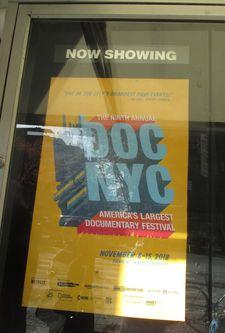 |
| DOC NYC poster at the IFC Center Photo: Anne-Katrin Titze |
RM: Well, we found the stories.
AKT: How did you find them?
RM: Like any documentary. We were approaching this like a traditional documentary. We had a documentary research team which are basically journalists and we're trying to find interesting stories. We were trying to avoid anything that felt like a cliché of something that you'd already seen in Japan. And trying to find people that were engaging on camera.
AKT: The chef [Hisato Nakahigashi] picking ferns in the beautiful forest - that is very engaging. So where is storytelling going in your opinion? What kind of entertainment? Does it need an issue, a message? How would you sum up the future of your industry?
RM: It depends from what perspective. I think storytelling on any level is important. People want to be engaged, they want to watch good stories - that's the big picture. Then you have the challenge of what people in the advertising world and the marketing world have to do. Obviously, they're selling something. We all are. We're all selling something.
Everyone's moved away from cable, so they're not watching ads. They're not forced to watch ads to watch Breaking Bad or whatever. They can skip it. And on the internet we can all skip it. I have some friends who have some kids and over time they see a commercial, they call it 'skip ad'. So clients have to re-think what they are doing.
AKT: So being in DOC NYC, for example?
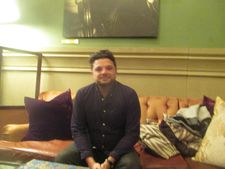 |
| Takumi: A 60,000 Hour Story On The Survival Of Human Craft executive producer Andy Roberts Photo: Anne-Katrin Titze |
RM: Oh, we've done it quite a few times now. We did this documentary with Werner Herzog, called Lo And Behold, which we got into Sundance. We sold, you know, for quite a lot of money. It was paid for by a brand. But it wasn't about the brand. It was to create a conversation around the internet and the future. And he [Herzog] had final cut. So I think you can do these things with a brand because everything's paid for by a brand, ultimately.
Netflix is a brand and Disney is a brand. As far as we're concerned when we do one of these, whether we're working for Nike or Netflix, it's the same process. Because we have to find something that is interesting, that's going to be entertaining to an audience.
So it's what the audience finds interesting as opposed to talking about a brand, which is basically quite dumb. That's the future in terms of that world of doing things in the entertainment world but in partnership with brands. I think that's what's going to happen more and more quite naturally.
Most film festivals already have brands involved. Sundance got more brands than you can shake a stick at. It doesn't even feel like a film festival, it feels like a brand festival when you walk in there. There's a way to do films with a brand. You can make your own film but you also serve what the brand needs or is trying to do - without it feeling like an ad.
AKT: Besides the Herzog film, you say you had several other films in festivals?
RM: We did the don't text and drive film [From One Second To The Next] again with Werner. We did a documentary called Bending the Light with Michael Apted, which was about the art of photography and film. That was for Canon.
Coming up - Conversations with Takumi writer Dave Bedwood and executive producer Andy Roberts.
The ninth annual DOC NYC runs through November 15.
























